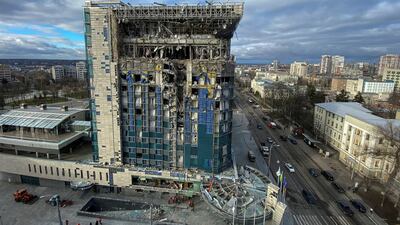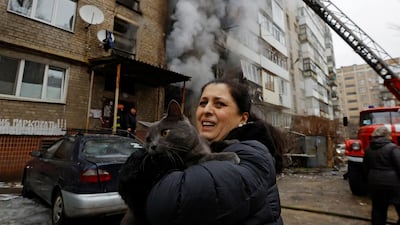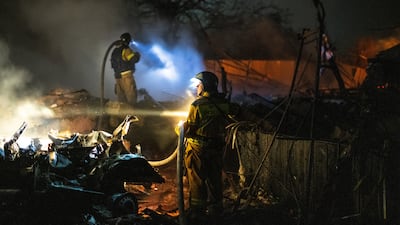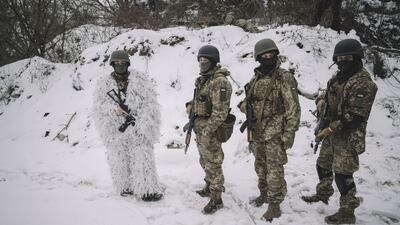This is the time of year when Scottish men – including me – wear traditional highland dress. The tartan kilt is worn on and around Burns Night to celebrate the birth in January 1759 of the great Scottish poet Robert Burns.
I was a speaker at a formal “Burns Supper” in London, paying tribute to the genius of our national poet. The traditional food during this annual festival is Scottish, as you would expect. It includes haggis (a kind of sausage, which is delicious). The haggis is paraded around the dining room on a large silver platter, following a bagpiper playing a traditional Scottish tune. The piper also wears the kilt.
For many of us, these traditions bring back sentimental thoughts of the past, of dinners with loved ones who are no longer with us. This year, the memories were especially sharp.
I’m one of the first generations in my Scottish family not to have been forced into military service by conscription into the British army or other branches of the armed services. My family were often in the Scottish infantry. They wore the kilt in the Seaforth Mackenzie tartan because they were Seaforth Highlanders, an old army regiment that suffered many casualties in the First World War.
I have in my filing cabinet a letter sent to my family in Glasgow in 1917 informing them of the death of one relative killed by German machine gun fire in the Battle of Passchendaele. The letter, from his commanding officer, reveals the pain felt by his comrades at his loss.
Much later, my father was also in the British army. He also wore Seaforth Mackenzie tartan, and so do I. Doing so is a celebration of Burns Night and being Scottish, but it’s also tinged with memories of people in the family who are no longer with us, some of whom died in the service of their country.

The reason I am thinking of this now is that there are rumblings within British military circles, and also within Nato, about the relative weakness of British armed forces. This has led to a public debate about whether conscription – forced military service – might ever return in Britain.
US Navy Secretary Carlos Del Toro suggested that worldwide strategic threats mean the British Royal Navy is underpowered and needs a boost. The military committee chair of Nato, Admiral Rob Bauer, and the outgoing British army chief, Gen Patrick Sanders, also warned of potentially a wider European war if Russia defeats Ukraine. Meanwhile, the US Air Force is putting nuclear weapons back in a refurbished air force base in eastern England.
What is fascinating about all this military discussion is that the British government has for years been scaling back defence spending. One central plan has been to cut back the full-time British army to about 73,000 troops.
Some reports claim that this is a level last seen after the defeat of Napoleon in 1815, although I think that is not correct. Historians suggest that after Napoleon’s defeat at Waterloo, the British army was cut back to 90,000. It looks as if the deeper cuts now to 73,000 full-time soldiers would take Britain back to the troop numbers of 1715, a year after the end of the war of the Spanish Succession.
Whatever the historical context, the result is indisputably a much weaker British military. This was acknowledged by former defence secretary Ben Wallace in 2022. He warned that the army nowadays was only big enough to “stay at home and tootle around”.
The depleted state of the Royal Navy may be even more significant. It takes a long time to commission and build modern warships and a Reuters report in 2016 concluded: “The Royal Navy is a shadow of its former self. Government budgeteers have repeatedly, and excessively, cut the numbers of its ships, planes and manpower. It can barely patrol the United Kingdom’s own waters, much less project British influence abroad.”
What makes the problem worse is that the under-resourcing of the military has been compounded by a failed recruitment programme, handled by a private recruitment company, along with government failures to get a grip and make a military career attractive to younger people.
Since Brexit, as leading British diplomats know only too well, the UK has not only diminished its role in Europe but as a result, it has become a much less significant ally to America. When US President Joe Biden decided to pull his country’s troops out of Afghanistan, for example, Britain was informed rather than consulted.
No one thinks the British government right now has plans to introduce conscription into the armed forces. But for many years, until the invasion of Ukraine, a major land war in Europe was also unthinkable. The 2020s are proving that the world is particularly dangerous and unpredictable.
The tradition of wearing the kilt into battle has, unfortunately, been matched by another British tradition, that of being unprepared for conflict until it bursts upon us. That’s a tradition we should also remember. And avoid.






















